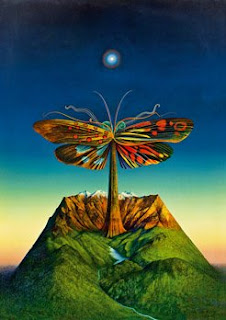His concept of magical idealism made human beings the authors of the nature that they perceive. This ‘romanticization’ of nature means that humans can become reflectively aware of this capacity to merge with nature, and hone it consciously. So these ‘artists of nature’ transform the world into a welcoming ‘thou’ instead of an alienating threat.
He said, “Every beloved object is the centre of a paradise.”
This communion with nature was a huge leap during Novalis’ time, since 18th century people still saw the world as threatening and unknown, just before the Industrial Revolution’s re-imagination of it as ripe for the plundering.
Currently our most widely distributed weltanschauung sees nature primarily as victim, with sorrow, regret and pain about what has been and is being done to it: climate change, animal extinction, loss of habitat, genetic manipulation, et cetera. There is a great deal of fear in this which is self-perpetuating, and generates a belief in the inevitability of further loss and destruction, which is likewise internalised in the human as a pessimistic dread of our own pollution.
“I will sink down into dewdrops and mingle myself with ashes.”
I think of Julia Butterfly and her activist odyssey in Luna the tr ee, when I think of the physical practice of this, or Sandra Ingerman’s Medicine for the Earth. So, it is happening today. Look how much change can occur from the work of single people.
ee, when I think of the physical practice of this, or Sandra Ingerman’s Medicine for the Earth. So, it is happening today. Look how much change can occur from the work of single people.
Here are some more grains of Novalis’ Pollen.
A character is a completely fashioned will.
Philosophy is actually home-sickness; the wish to be at home—everywhere.
The person is a sun, her senses are as planets.
(I’m using the feminine pronoun here, just for kicks)
Sleep is only for the inhabitants of planets. In another time, people will sleep and wake continually at once. The greater part of our body, of our humanity itself, yet sleeps a deep sleep.
There is but one temple in the world; and that is the body of humanity. We touch heaven when we lay our hands on a human body.
Nature is a harp, a musical instrument whose tones are keys to numinous strings in us.
"It is only due to physical weakness and our inner turmoil that we do not see ourselves in a fairy-world. All fabulous stories and fairy tales are merely dreams of that home world, which is everywhere and nowhere. Our numinous powers, which one day as genies shall fulfil our will, for the present are muses which refresh us with sweet remembrances during our toilsome course."
(to be continued...)


No comments:
Post a Comment